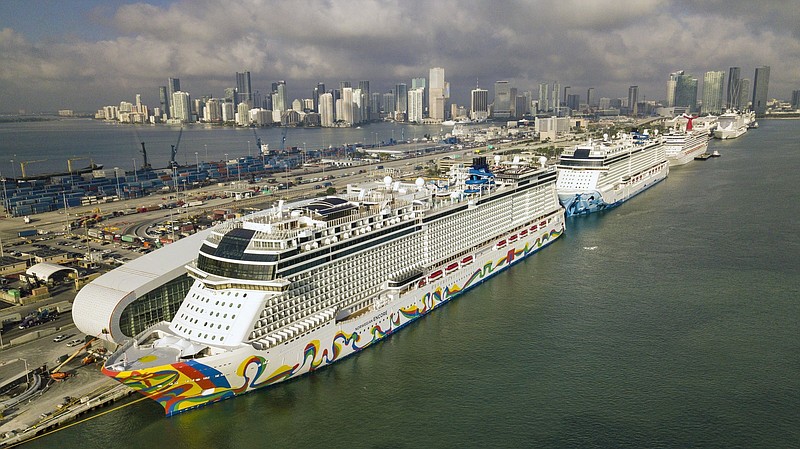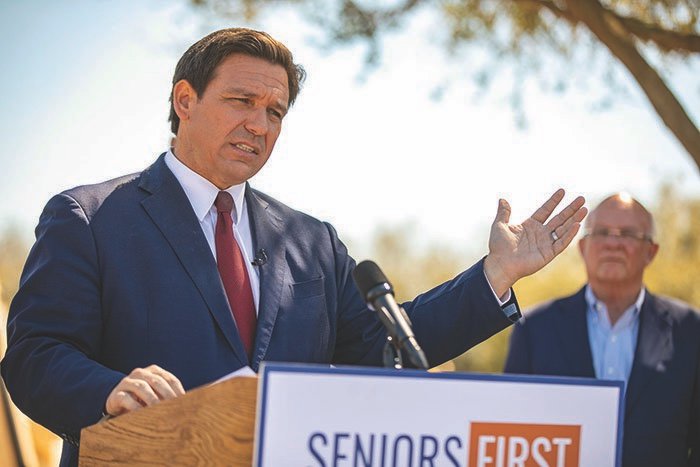The return of operations for one of South Florida's most iconic industries has turned into a battle of the heavyweights.
On the one side is Florida Gov. Ron DeSantis. Emboldened by growing approval ratings, DeSantis refuses to budge from a state law he sought that bars the cruise industry from requiring passengers be vaccinated.
On the other: The industry, a powerful pillar of Florida tourism, is quietly crafting a work-around for the governor's mandate as it seeks to restore public confidence and restart cruising after a 15-month shutdown that has put thousands of Florida jobs on hold and cost the industry billions - not including losses to its suppliers.
The vaccine conflict is not an ideal setting for the industry's restart, said Rockford Weitz, director of the Maritime Studies Program at Tufts University's Fletcher School.
"This is definitely not how the cruise industry would prefer it to unfold," he said. "Unfortunately, the politics of vaccines has put the industry between a rock and a hard place - between Florida and the CDC who have totally different views on how they should operate their businesses."
Along with the economic costs are the potential health consequences. According to experts, vaccines are the most important way to prevent deadly COVID-19 outbreaks on cruise ships.
Cruises have resumed from Caribbean ports and, so far, all adult passengers have been required to be vaccinated. In at least one case, those requirements prevented what may have otherwise become a deadly outbreak.
At U.S. ports, some cruise companies vow to defy Florida's ban and restart cruises as soon as June 26 using the same vaccine requirements, in violation of Florida's law. Other companies have backed down, saying they won't require proof of vaccines. At least one, Royal Caribbean International, has embarked on a two-pronged approach, encouraging all passengers to be vaccinated and, while not requiring them, imposing more restrictions and costs on unvaccinated passengers.
The cruise industry, which employs about 600,000 South Floridians directly and indirectly and has ports in seven Florida cities, is so important to the state's economy that DeSantis sued the Centers for Disease Control and Prevention in April challenging its cruise safety rules and demanding that cruises be allowed to resume immediately without restrictions.
With just two weeks until the first U.S. cruise since March 2020 leaves from a U.S. port - Fort Lauderdale's Port Everglades - companies say they are still determining what to do about vaccines for cruises from Florida.
Although Florida law prohibits businesses from asking patrons if they have been vaccinated, there is nothing stopping the cruise lines from having passengers volunteer the information. Celebrity Cruises is telling passengers 16 years old and older that if they choose not to volunteer proof of vaccination, they will be treated as if they are unvaccinated and be required to follow CDC guidelines for masks and social distancing as well as be subjected to COVID-19 testing - at additional cost.
Royal Caribbean International, Celebrity Cruises parent company, originally said it would require all passengers to be vaccinated, then softened its stance to say that passengers who board their cruises from Florida are "strongly recommended" to get vaccinated before traveling. And in a statement to the Miami Herald this week, it indicated that it would subject non-vaccinated passengers to more restrictions and costs than vaccinated passengers.
"For cruises departing from Florida ports all guests are strongly encouraged to be fully vaccinated," spokesperson Jonathon Fishman said in a statement. "Guests eligible but not fully vaccinated will be subject to testing and additional health protocols at their own expense. Children not eligible for vaccines will be subject to complimentary testing and health protocols."
According to Fishman, passenger surveys indicate that "90% of them have said that they will be fully vaccinated or plan to be prior to their first cruise" but Royal Caribbean International has not indicated how it will differentiate between vaccinated and unvaccinated passengers.
Celebrity Cruises has already tested the value of vaccinations. On Thursday two passengers aboard the Celebrity Millennium ship - the Caribbean's first since November - tested positive for COVID-19.
The infected passengers were vaccinated and reportedly asymptomatic, the company said. Their infections were discovered when the ship staff began conducting antigen tests required in order for passengers to disembark when it returns to St. Maarten on Saturday. Celebrity Cruises provided private transportation for them to return home.
DeSantis: personal liberties over free market
The conflict between the governor and the cruise ship titans has served to burnish the governor's libertarian image among vaccination opponents in brewing culture wars as he seeks reelection next year and a growing national political profile.
But it also has raised questions about the Republican governor's decision to use government mandates, instead of the free market, to determine what corporations that have been among his party's closest allies should do.
"It's behavioral socialism," Sen. Jason Pizzo, a Miami Democrat. "The definition of socialism is the means and manufacturing, production and control of things that are under the government. These cruise companies are making decisions based on a reasonable contemplation of liability, safety, and reputation."
The conflict could result in precedent-setting implications for the industry at ports across the nation. Florida and Texas ban the notion of compulsory vaccines, arguing individual liberty, while other states with significant cruise traffic such as Alaska and California allow it.
The cruise companies could make a strong case that their business is conducted mostly outside of Florida, and therefore the state law doesn't apply to them, said Martin Davies, director of the Maritime Law Center at Tulane University. Though cruise companies are headquartered in South Florida, they operate as foreign companies.
"You cannot tell us - a foreign company with a foreign flagged ship going to a foreign place - who we can allow to board," he said. "They definitely have an arguable case if they want to say that the order doesn't apply to their business."
The problem for cruise companies, however, is that they screen passengers in the cruise terminal, not on the ship, Davies said, meaning the screening - and breaking of Florida law - will happen in Florida.
Last year, during the early days of the pandemic, DeSantis imposed his first restrictions on the industry when he initially refused to let 450 passengers from the Holland America Line's Zaandam cruise ship - including 73 with flu-like symptoms - disembark in Florida. Florida eventually became a safe haven for cruise ships turned away by other ports; dozens of passengers and crew members were evacuated to South Florida hospitals and several died.
This year, as the industry sought to sooth fears of people spooked by the stories of passengers and crews trapped on ships for days, DeSantis insisted that they could not mandate vaccinations.

